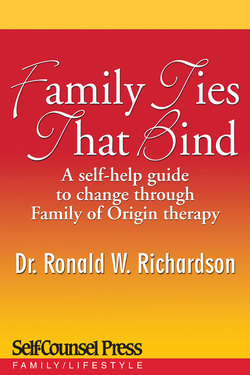Читать книгу Family Ties That Bind - Dr Ronald W. Richardson - Страница 16
На сайте Литреса книга снята с продажи.
2.3 “I’m the king of the mountain” — The attackers
ОглавлениеAttackers deal with their anxiety about differences by blaming others for their anxiety as well as for everything else. They know what they want, and are very upset when they don’t get it. They think the other is the cause of their frustration and they are not shy about saying that. “If only you would shape up (or be more understanding, or loving, or whatever), then I wouldn’t feel so bad.” The attacker sees the other as the problem and openly tries to change the other by using whatever means possible.
A relationship in which both partners are attackers resounds to the sound of battle. The attacks and counterattacks are almost continuous as each partner attempts to demonstrate superiority or, at a minimum, equality with the other in all things. It doesn’t matter what the topic of argument is; it could be as simple as what movie to see. Unless one does it or sees it or understands it in the same way, the other feels put down. A huge expenditure of energy goes into getting the other to cry uncle.
Example
Donna and Geoff were in almost constant conflict over their differences in matters of taste. For example, Donna liked classical music and intellectual books. Geoff liked rock music and mysteries. They never lost an opportunity to take a jab at each other. Geoff accused Donna of snobbishness and elitism. Donna accused Geoff of being stupid and plastic. They were both, of course, anxious about their differences because they feared the disapproval of the other, so they worked hard at trying to convince the other of the “rightness” of their likes and dislikes.
During therapy, as they each began to feel more comfortable with their own values, they felt less of a need to insist that the other share those values. They were eventually able to acknowledge that they were just different, and there was no right or wrong. Once they accepted the differences, they were better able to negotiate. For example, they took turns deciding which radio station to have on in the car without criticizing the choice of the other. Without the personal attacks, they came to resolutions much more quickly and without either of them feeling attacked.
People engaged in such a power struggle often think the other has to change before they can change. They get caught up in a circle of hostility, where each one’s “bad” behavior justifies the other’s “bad” behavior. He says to her, “I wouldn’t drink so much if you didn’t nag so much.” She says, “I wouldn’t nag so much if you didn’t drink so much.” Somebody has got to stop first to end this impossible situation.
Part of the underlying problem with the attackers is their low self-esteem. Consciously or unconsciously, neither partner feels very good about himself or herself; each wants the other one to make him or her feel better. Of course, a person under attack isn’t able to be very giving, so the strategy is self-defeating.
Example
Bette and Azeem blamed each other for the problems in their marriage. Each thought he or she was doing it “right” and the other was doing it “wrong.” It didn’t matter what the issue was, large or small: which way to drive to grandma’s, where to go on vacation, who spent the most money. Each could give an elaborate diagnosis of where the other was at fault.
They decided to try marriage counseling, but each went to get the other one fixed up.
The therapist’s questions about family background and past experiences were initially treated as irrelevant and unnecessary since neither Bette nor Azeem thought their own family background was a problem. However, both could see clearly how the other’s family background was a problem and became enthusiastic about analyzing the other family and its strangeness. When Bette and Azeem finally explored their own experiences and feelings in their family of origin, they saw how their patterns in their marriage had developed in their families. They realized they each had a fragile self-esteem and were super-sensitive to any criticism from significant others. As they began to take more responsibility for their own feelings and expected less from the other, their power struggles decreased, although they sometimes fought over who was doing the best job of changing!
QUESTIONS
1. Who was involved in overt power struggles in your family? How did the power struggles get started? How did they end?
2. Are you involved in any power struggles today? What else could you do rather than attack and counterattack? What is it that hooks you into the fight?
